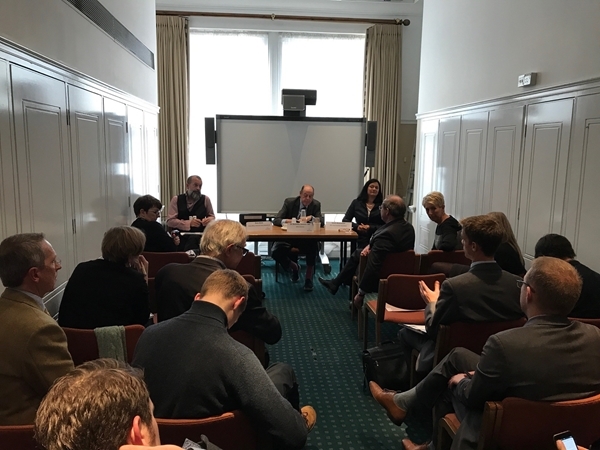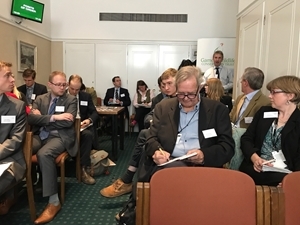
Hotly-contested issues surrounding soil management and the use of pesticides were discussed at the Game & Wildlife Conservation Trust’s (GWCT) All Party Parliamentary Group (APPG).
"Making regulation effective: scientific evidence or the precautionary principle?" was the subject of discussion led by two guest speakers.
The topic for this APPG, which took place on Thursday November 16, was chosen in response to concerns over post-Brexit agricultural regulation of pesticides and the declining state of British soil.
First to speak at the well-attended event was Sarah Mukherjee, chief executive officer of the Crop Protection Association, who was followed by Nick Mole, policy officer at Pesticide Action Network UK, while Rt Hon Sir Nicholas Soames chaired.
Ms Mukherjee kickstarted the discussion by asserting how the precautionary principle (as embedded in EU policy and practice) can stifle innovation.
However, she also said: “I want to make it clear that we do not want to see the diminution of environment standards post-Brexit. This is in nobody’s interest.
“I’ve been really encouraged and inspired by the commitment towards stewardship and best practice shown by our members. But there is a danger if you say that that only innovation can proceed if you prove no harm.”
Ms Mukherjee went on to add that “risk assessment can deliver high environmental standards while producing more appropriate decisions than a hazard-based or precautionary approach because it allows the valuator to take into account a fuller picture of available information”.
In contrast to this, fellow panelist Mr Mole focused on how the precautionary principle can encourage innovation in the wake of Brexit.
He said: “From my point of view, it’s a good principle and a common sense principle.
It’s a driver for innovation and particularly in the pesticide industry.”
He went on to use the cite the examples of the much-talked about neonicotinoids and glysophates and of how using the precautionary principle has altered how they are viewed and used over time.
Explaining his point, he said: “Over 75 cent of all glyphosate used in the past 40 years was sprayed in the last 10 years. Perhaps, if we are a bit more judicious and invest in alternatives then maybe these things wouldn't be facing a ban. It’s a lack of appropriate innovation that has led to this pathway.
 “We need to find new, innovative ways to work with nature. We need to reverse the declines in farmland birds and need to protect our pollinators and our health.”
“We need to find new, innovative ways to work with nature. We need to reverse the declines in farmland birds and need to protect our pollinators and our health.”
The different viewpoints enabled the invited guests, pictured right, to ask a range of questions and led to a lively and informative debate.
It was organised by GWCT’s director of policy, Alastair Leake, who is based at the Allerton Project in Loddington.
Notes to editors
The Game & Wildlife Conservation Trust – providing research-led conservation for a thriving countryside. The GWCT is an independent wildlife conservation charity which has carried out scientific research into Britain’s game and wildlife since the 1930s. We advise farmers and landowners on improving wildlife habitats. We employ more than 60 post-doctoral scientists and other research staff with expertise in areas such as birds, insects, mammals, farming, fish and statistics. We undertake our own research as well as projects funded by contract and grant-aid from government and private bodies.
For information, contact:
Eleanor Williams
Telephone: 07592 025476
Email: press@gwct.org.uk